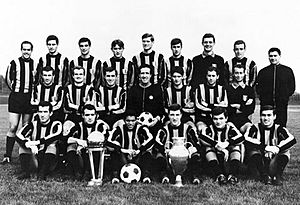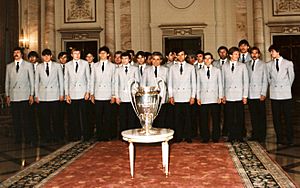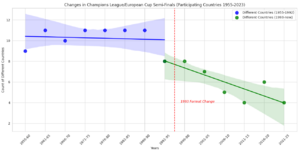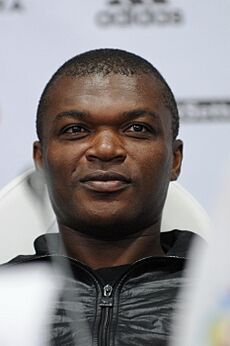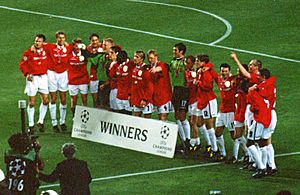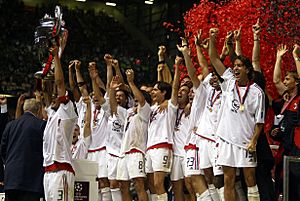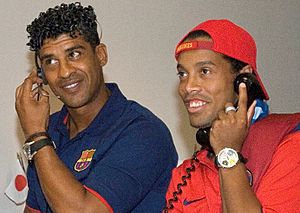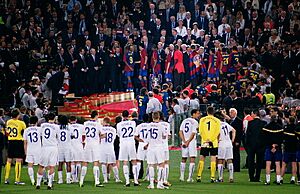History of the European Cup and UEFA Champions League facts for kids
The history of the European Cup and UEFA Champions League tells the story of over sixty years of exciting football. This competition has crowned champions and runners-up from all over Europe, showing who the best club teams are each year.
Contents
- How it All Began
- Timeline of Champions
- 1955 to 1960: Real Madrid's Early Wins
- 1961 to 1962: Benfica's Success
- 1963 to 1965: Milanese Mastery
- 1966: Real Madrid Returns
- 1967: The Lisbon Lions
- 1968: The First English Team Wins
- 1969: AC Milan Again
- 1970 to 1973: Dutch Control
- 1974 to 1976: Bayern Munich's Hat-trick
- 1977 to 1984: The English Reign
- 1985: The Heysel Disaster and its Impact
- 1986 to 1988: Unexpected Winners
- 1989 to 1992: AC Milan's Dominance and Barcelona's First Title
- 1993: The Birth of the Champions League
- 1994 to 1997: Milan, Ajax, Juventus, and Borussia's First Title
- 1997–2002: Real Madrid and Bayern Munich Return to Dominance
- 2003–2008: Italian and English Teams Shine
- 2008–2018: Spanish Dominance
- 2018–Present: Premier League Leads the Way
- How the Tournament Format Changed
- Countries in the Competition
How it All Began
Early Football Tournaments
Long ago, even before the European Cup, football clubs from different countries sometimes played against each other. The very first time champions from two European leagues met was in 1895. Sunderland, the English champions, beat Heart of Midlothian, the Scottish champions, in a match called the "1895 World Championship."
Other early competitions included the Challenge Cup (started in 1897 for clubs in Austria-Hungary) and the Mitropa Cup (started in 1927 for central European teams). These tournaments helped clubs from different countries play each other, which was new and exciting. After World War II, the Latin Cup was created for teams from France, Italy, Spain, and Portugal.
The Idea for the European Cup
The idea for a big European club tournament came from a similar competition in South America, the "South American Championship of Champions," which started in 1948. French sports journalists Jacques Ferran and Gabriel Hanot were very inspired by this. They thought Europe should have its own major club championship.
In 1953, an English team called Wolverhampton Wanderers played a series of friendly matches against strong foreign teams. After beating a famous Hungarian team, Honvéd, the British press called Wolves "Champions of the World." This made Hanot realize it was time for a proper European-wide tournament to find the true best team on the continent.
He wrote: "Before we declare that Wolverhampton are unbeatable, let them go to Moscow and Budapest. And there are other internationally famous clubs: AC Milan and Real Madrid to name just two. A club world championship, or at least a European one – bigger, more important and more famous than the Mitropa Cup – should be started."
The idea was approved in 1955, and the first European Cup began the very next season!
Timeline of Champions
1955 to 1960: Real Madrid's Early Wins
Real Madrid was incredibly strong in the first five years of the competition. Led by amazing players like Ferenc Puskás and Alfredo Di Stéfano, they won every single final from 1955 to 1960. Their most famous win was in the 1960 European Cup final in Glasgow, Scotland, where they beat Eintracht Frankfurt 7–3 in front of over 127,000 fans!
Hibernian from Scotland was the first British club to play in the European Cup, reaching the semi-finals in the first tournament in 1955.
1961 to 1962: Benfica's Success
Real Madrid's winning streak was finally broken by their rivals, Barcelona, in 1960. However, Barcelona lost the final to Benfica from Portugal. Benfica, with their legendary player Eusébio, then won the trophy again in 1962, beating Real Madrid 5–3 in the final.
1963 to 1965: Milanese Mastery
Benfica reached the final for a third time in 1963 but lost to Milan. Milan's city rivals, Inter Milan, then won the trophy twice in a row in 1964 and 1965. This period was known as Grande Inter (Great Inter) in Italy.
1966: Real Madrid Returns
Real Madrid came back to win their sixth European Cup in 1966, beating FK Partizan. Interestingly, this Real Madrid team was made up entirely of Spanish players, unlike their earlier international squads.
1967: The Lisbon Lions
In 1967, Celtic from Scotland became the first team from Northern Europe to win the competition. They beat Internazionale 2–1 in Lisbon. This team was special because all the players, known as the Lisbon Lions, were born within 30 miles (48 km) of their home stadium in Glasgow!
1968: The First English Team Wins
Ten years after the sad Munich air disaster, Manchester United became the first English team to win the European Cup in 1968. They beat Benfica 4–1 in extra time at Wembley Stadium in London. Their manager, Matt Busby, and two players, Bobby Charlton and Bill Foulkes, had survived the Munich crash, making this victory very emotional.
1969: AC Milan Again
Milan won the trophy again in 1969, beating Ajax in the final. This match showed that Dutch teams were becoming strong in European football.
1970 to 1973: Dutch Control
In 1970, Feyenoord from the Netherlands won the European Cup. For the next three years, Ajax, with their famous "Total Football" style and star player Johan Cruyff, dominated. They won three finals in a row, beating teams like Panathinaikos, Inter Milan, and Juventus.
1974 to 1976: Bayern Munich's Hat-trick
The mid-1970s belonged to Bayern Munich from Germany. Led by Franz Beckenbauer, they also won three European Cups in a row, just like Ajax. They beat Atlético Madrid in 1974, Leeds United in 1975, and Saint-Étienne in 1976. Many of these Bayern players also helped Germany win the UEFA Euro 1972 and the 1974 FIFA World Cup.
1977 to 1984: The English Reign
English clubs then took over the competition. Liverpool won in 1977 and 1978. Then, Nottingham Forest, managed by the unique Brian Clough, won the tournament in 1979 and 1980. They are the only team to have won the European Cup more times (twice) than their own domestic league (once)! Liverpool won again in 1981.
Another English club, Aston Villa, won in 1982. After a German team, Hamburg, won in 1983, Liverpool returned in 1984 to win their fourth trophy. They beat Roma in a penalty shoot-out in Rome, with their goalkeeper Bruce Grobbelaar famously distracting the Roma players with his "spaghetti legs" dance.
1985: The Heysel Disaster and its Impact
In 1985, Liverpool played Juventus in the final. Sadly, before the match, there were serious crowd problems at the Heysel Stadium in Brussels. This led to a five-year ban from European competitions for all English clubs, and Liverpool received an extra year's ban. This event had a big impact on English football for many years.
1986 to 1988: Unexpected Winners
After the ban, the European Cup was won by some unexpected teams. FCSB from Romania won in 1986, with their goalkeeper saving four penalties in the final shootout. Porto from Portugal won in 1987 with a famous back-heel goal. And PSV Eindhoven from the Netherlands won in 1988.
1989 to 1992: AC Milan's Dominance and Barcelona's First Title
In 1989, Milan won the European Cup again after 20 years, beating Steaua București 4–0. They kept their title in 1990, beating Benfica. This Milan team was incredibly strong, with Dutch stars like Marco van Basten and Ruud Gullit, and a legendary Italian defense.
In 1991, Red Star Belgrade from Yugoslavia won the trophy. The 1991–92 European Cup was the last season under the old name and format. The quarter-finals were changed to a group stage. The final in 1992 was won by Barcelona, coached by Johan Cruyff, who had built a team nicknamed the "Dream Team."
1993: The Birth of the Champions League
The competition was officially renamed the UEFA Champions League for the 1992–93 season. This brought new marketing and TV rights, making the tournament even bigger.
Marseille from France won the first Champions League final in 1993, beating Milan. However, they were later involved in some domestic football problems and were not allowed to defend their title. Marseille remains the only French club to have won this competition.
1994 to 1997: Milan, Ajax, Juventus, and Borussia's First Title
Milan won the trophy again in 1994, beating Barcelona 4–0 in a fantastic performance. Milan defender Marcel Desailly made history by winning the Cup in two consecutive seasons with different clubs (Marseille in 1993 and Milan in 1994).
In 1995, a young Ajax team beat Milan 1–0 to win the trophy. Ajax then reached the final again in 1996 but lost to Juventus in a penalty shoot-out.
Borussia Dortmund from Germany won their first Champions League title in 1997, beating Juventus 3–1 in the final. A young substitute, Lars Ricken, scored a memorable goal just 16 seconds after coming on!
1997–2002: Real Madrid and Bayern Munich Return to Dominance
In 1997–98, UEFA changed the rules to allow more top teams from big leagues to compete, including league runners-up.
1998: Real Madrid, Back on Top
Real Madrid won their seventh European Cup in 1998, their first since 1966. They beat Juventus 1–0 in the final.
1999: Manchester United's Amazing Comeback
The 1999 UEFA Champions League final is famous for Manchester United's incredible comeback. United were also chasing a "treble" (winning their league, domestic cup, and the Champions League). Against Bayern Munich, United were losing 1–0 as the game entered injury time. But then, two substitutes, Teddy Sheringham and Ole Gunnar Solskjær, scored two goals in less than two minutes to win the trophy 2–1! Their manager, Alex Ferguson, famously said: "Football, bloody hell." It was United's first win since 1968.
2000 to 2002: Spanish and German Powerhouses
The 1999–2000 season saw Spanish clubs dominate. For the first time, two teams from the same country, Real Madrid and Valencia, met in the final. Real Madrid won 3–0.
In 2001, Bayern Munich won the trophy, beating Valencia in a penalty shoot-out. Valencia had now lost two finals in a row.
Real Madrid won their ninth European Cup in 2002, beating Bayer Leverkusen 2–1. The winning goal was a spectacular volley by Zinedine Zidane, which is still remembered as one of the best goals in final history.
2003–2008: Italian and English Teams Shine
2003 and 2004: All-Italian Final and Porto's Surprise Win
In 2003, two Italian teams, Milan and Juventus, met in the final. Milan won their sixth European Cup after a penalty shoot-out.
There was a big surprise in 2004 when Porto from Portugal, managed by José Mourinho, defeated Monaco 3–0 to win the Champions League. Neither team was expected to reach the final, but they beat many strong clubs along the way.
2005 to 2008: Liverpool's Miracle, Barcelona, Milan, and Manchester United
The 2005 UEFA Champions League final was one of the most dramatic ever. Six-time champions Milan faced four-time winners Liverpool. Milan were leading 3–0 at half-time, but Liverpool scored three goals in just six minutes in the second half to make it 3–3! Liverpool then won the trophy in a penalty shoot-out, in what is known as the "Miracle of Istanbul."
In 2006, Barcelona won their second Champions League title, beating Arsenal 2–1 in the final. Arsenal's goalkeeper was sent off early in the game, but they still managed to score first before Barcelona came back.
In 2007, Milan got their revenge on Liverpool, beating them 2–1 in the final to win their seventh European Cup.
The 2008 UEFA Champions League final was the first time two English clubs met in the final: Manchester United and Chelsea. The game ended 1–1 after extra time. Manchester United won the trophy in a penalty shoot-out, with their goalkeeper Edwin van der Sar saving the final penalty.
2008–2018: Spanish Dominance
The next ten years saw Spanish clubs, especially Barcelona and Real Madrid, dominate the competition.
2009 to 2011: Guardiola's Barcelona and Mourinho's Internazionale
In 2009, Barcelona, managed by Pep Guardiola in his first season, beat Manchester United 2–0 in the final. This win completed a "treble" for Barcelona, as they also won their domestic league and cup. Guardiola became the youngest coach to win the trophy.
In 2010, Internazionale, coached by José Mourinho, beat Bayern Munich 2–0 in the final.
In 2011, Barcelona and Manchester United met again in the final at Wembley Stadium. Barcelona won convincingly 3–1, securing their fourth Champions League title.
2012 to 2013: Chelsea's First Title and Bayern's Return
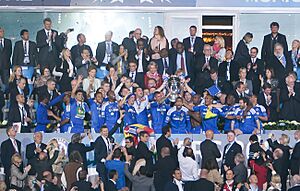
On 19 May 2012, Chelsea won their first Champions League title. They beat Bayern Munich in Bayern's home stadium, the Allianz Arena. The game ended 1–1 after extra time, and Chelsea won 4–3 on penalties, with Didier Drogba scoring the winning kick.
The 2012–13 season saw the first all-German final between Bayern Munich and Borussia Dortmund. Bayern won 2–1, with Arjen Robben scoring the winning goal late in the match. This win also completed a treble for Bayern.
2014 to 2018: Real Madrid's Unprecedented Success
Real Madrid won their tenth European Cup, known as La Décima, in 2014. They beat their city rivals Atlético Madrid 4–1 in extra time in the final. Atlético had been leading until a late goal by Sergio Ramos forced extra time.
In 2015, Barcelona won their fifth Champions League trophy, beating Juventus 3–1. This made Barcelona the first European club to win the continental treble twice! Their attacking trio of Messi, Suárez, and Neymar (called "MSN") scored a record 122 goals that season.
In 2016, Real Madrid and Atlético Madrid met in the final again. Real Madrid won their 11th title after beating Atlético 5–3 on penalties.
Real Madrid then made history by becoming the first team to defend their title in the Champions League era, winning in 2017 against Juventus. This was their 12th title. They won their third title in a row in 2018, beating Liverpool 3–1 in Kyiv. This amazing achievement is known as La Duodécima.
2018–Present: Premier League Leads the Way
The years after 2018 saw English clubs have great success, with two all-English finals.
2019: English Teams in the Final
In 2019, Liverpool won their sixth European Cup, beating fellow English side Tottenham Hotspur 2–0 in the final. Both teams had achieved incredible comebacks in their semi-final matches. Liverpool came back from a 3–0 first-leg defeat to Barcelona, winning the second leg 4–0. Tottenham scored three second-half goals to beat Ajax on away goals.
2020: COVID-19 Pandemic and Bayern's Dominance
The 2019–20 season was affected by the COVID-19 pandemic. Many matches were suspended and then played without fans. The final was moved to Lisbon.
Bayern Munich had a perfect season in the Champions League, winning every single match. They beat Paris Saint-Germain 1–0 in the final, with former PSG player Kingsley Coman scoring the winning goal. This win gave Bayern their sixth European Cup and their second treble in club history.
2021: Super League Threat and Chelsea's Surprise
The 2020–21 UEFA Champions League continued despite the pandemic. During this season, a plan for a "Super League" was announced by some of Europe's biggest clubs. This idea would have changed football forever and threatened the Champions League. However, strong opposition from fans, governments, and football organizations quickly led to most clubs withdrawing from the Super League.
In the final, Chelsea surprised many by defeating Manchester City 1–0 to win their second Champions League title.
How the Tournament Format Changed
The way the Champions League is played has changed a lot over the years.
- 1955–1991: It started as a simple knockout tournament. Only one club from each country (usually the league champion) could enter, plus the team that won the previous year.
- 1991–1993: A group stage was introduced in the quarter-finals. Two groups were formed, and the winners of each group played in the final. The competition was officially renamed the UEFA Champions League in 1992–93.
- 1993–1994: After the group stage, semi-finals were added before the final.
- 1994–1997: The group stage expanded to four groups. The winners and runners-up from these groups went into an eight-team knockout stage.
- 1997–1999: Up to two clubs from each country could now enter the competition.
- 1999–2003: The format became more complex with two group stages before the knockout rounds. Up to four clubs from the strongest countries could now enter.
- 2003–2024: The format became simpler with one group stage (eight groups) followed by a 16-club knockout phase. Up to four clubs per country could still enter.
- Since 2021: The "away goals rule" was removed. If teams are tied after two legs, they now go straight to extra time and then penalties if needed.
- Scheduled for 2024: The format will change again. The group stage will become a single "league stage" with 36 teams. Each team will play 8 different opponents. The top teams will go straight to the knockout phase, while others will play a play-off round to reach the knockouts.
Countries in the Competition
First Entry (Including Qualifying Rounds)
| Season | Nations |
|---|---|
| 1955–56 | |
| 1956–57 | |
| 1957–58 | |
| 1958–59 | |
| 1960–61 | |
| 1961–62 | |
| 1962–63 | |
| 1963–64 | |
| 1964–65 | |
| 1966–67 | |
| 1991–92 | |
| 1992–93 | |
| 1993–94 | |
| 1994–95 | |
| 1997–98 | |
| 2000–01 | |
| 2002–03 | |
| 2003–04 | |
| 2006–07 | |
| 2007–08 | |
| 2014–15 | |
| 2017–18 |
Group Stage Only
Since the group stage was added in 1991–92, some countries have only had teams reach this main part of the competition, not just the early qualifying rounds.
| Season | Nations |
|---|---|
| 1991–92 | |
| 1992–93 | |
| 1993–94 | |
| 1994–95 | |
| 1995–96 | |
| 1997–98 | |
| 1998–99 | |
| 1999–2000 | |
| 2002–03 | |
| 2003–04 | |
| 2006–07 | |
| 2008–09 | |
| 2010–11 | |
| 2015–16 | |
| 2017–18 | |
| 2021–22 |
 | Laphonza Butler |
 | Daisy Bates |
 | Elizabeth Piper Ensley |


